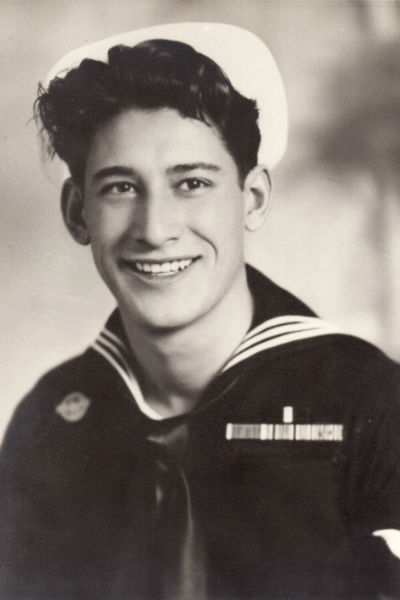Marquez, Eleuterio Joe
- Date of birth:
- February 21st, 1925 (Los Angeles/California, United States)
- Date of death:
- August 28th, 2015 (Oceanside/California, United States)
- Nationality:
- American (1776 - present, Republic)
Biography
He was still in high school during the opening years of World War II. At the age of 17, Joe, along with two of his best friends, Bob Warren and Sammy Petrovich, left school and traveled by train to Salt Lake City. They reported straight to the military enlistment center there and declared to the sergeant that they were ready to sign up to fight and defeat the enemies of America and half the world. That was the attitude of those whom we now call "The Greatest Generation". However, the recruiting sergeant asked them how old they were and after learning their ages, he told the three young men to go home and come back after they finished high school.
A year later, after finishing high school, again all three friends traveled to Salt Lake City to enlist. This time they succeeded. Joe chose the Navy, and while in boot camp in San Diego, he needed to decide what specialty he wanted to be assigned to. To him, the specialty of "hospital corpsman" sounded good. He imagined it would be a safe and clean job working in a hospital, not realizing that another term for "hospital corpsman" is "combat medic" and as a Navy hospital corpsman you are a combat medic for the Marines!
Many, seemingly endless days passed in preparation leading up to that fateful battle in September of 1944. Joe was assigned to the First Marine Division. The First Marine Division was given orders to take the tiny, and now mostly forgotten, Japanese held island of Peleliu in the South Pacific. The "top brass" believed it would be a relatively minor operation for the Marines. It was all expected to be over so quickly that the upcoming battle was barely even covered by the media. It turned out to be one of the bloodiest battles the Marines had ever fought.
The struggle for the possession of Peleliu had been raging for a week. On this night, Joe and his marine unit were attempting some much needed sleep on top a hill which they had only recently captured from the enemy. At that same moment, unknown to the battle weary marines, slowly and quietly, a unit of Japanese soldiers were making their way up the hill toward them with the intent of revenge and of regaining this tiny part of island which was slipping from their grasp.
In the pitch darkness, Joe was suddenly startled awake by the distinct "popping" sound he recognized as a firing pin. The fuse of a Japanese hand grenade began to count down its last seconds. Then the explosion: he felt his leg fly upward, hot metal shrapnel from the hand grenade and blasted pieces of coral which seconds before had been his bed, tore into Joe's leg.
Joe was lucky, he lay wounded, but around him lay the bodies of several less fortunate marines. A fierce and desperate hand-to-hand struggle ensued among the marine survivors and the Japanese soldiers. After desperate, "hour-long" minutes, after more Marine casualties and after every enemy soldier had met his end, the Marines had finally prevailed.
Nearly in shock, Joe lay wounded, but he realized he wasn't the only man on that dark terrifying hill in dire need of medical attention. More importantly, he knew he was the only man among them with the skill to save his wounded comrades. Joe asked the officer-in-charge to call in to have a flare dropped overhead in order to give him the light he would need to do his work, but the officer-in-charge was also wounded and his only response to him was, "You're in charge now, Doc". Despite his severely wounded leg, Joe dragged himself from marine to marine until he had attended to all the others. He ensured they were evacuated first before he accepted aid for himself, only then, finally allowing himself to be evacuated.
For this act of selfless heroism, Joe was awarded the highest honour given by the U.S. Navy, the Navy Cross. This experience defined him for the rest of his life.
Although he was released from his first active enlistment in 1945, he actually had continuous enlistment from the period 1943 to 1953, being in the inactive reserves from the period between 1945 and 1948. He re-entered active service in the Navy in 1948 until 1953. After WWII, the ratting, "PhM" was changed to "HM"; therefore, when he finally left the Navy in 1953, his rating and rate was "HM2", having been advanced from Petty Officer Third Class to Petty Officer Second Class.
Do you have more information about this person? Inform us!
- Period:
- Second World War (1939-1945)
- Rank:
- Pharmacist’s Mate Third Class, U.S. Navy R
Sources
- Photo 1: Richard Marquez
- - Recipients of The Navy Cross, 1916 - Present, by C. Douglas Sterner
- Richard Marquez



